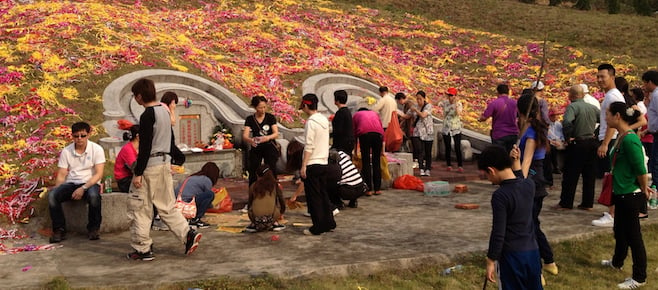Morbid tradition of ‘ghost marriages’ persists in rural China
The ancient custom of corpse matchmaking may be illegal, but activity has spiked
A scene from last year’s Qingming Festival. The festival is thought to be a lucky occasion for celebrating ghost marriages. (kevinykchan / Flickr)
Share

It’s a strange and morbid tradition, all but abandoned by modern China. But ghost marriages, the pairing of a deceased bachelor and bride to keep each other company in the afterlife, are quite the moneymaker for those willing to get their hands dirty.
Four men in China’s central Shanxi province were recently sentenced to more than two years in prison each for digging up the bodies of 10 female corpses, cleaning them, tampering with medical records to make them appear newly deceased and selling them on the black market for a sum of $39,000.
The ancient custom, which dates back to the 17th century BCE, rests on the belief that burying an unmarried young man with a “bride” can prevent his soul from becoming restless and lonely. It was outlawed in 1949 when Communist revolutionary Mao Zedong came to power, but is still practised in rural parts of several provinces, including Shanxi, Shaanxi, Henan and Guangdong. In Shaanxi, where coal money has resulted in an affluent but stubbornly superstitious population, families are willing to pay top dollar for suitable dead spouses, sometimes employing a matchmaker or even purchasing remains straight from the hospital morgue. Younger and more attractive bodies tend to cost more.
Demand has led to a spike in illegal activity in recent years: last February, a female was twice exhumed after being married off postmortem by her family, only to be sold again by graverobbers days later. A man from the northern Hebei province murdered six women in 2006 and sold them as corpse brides.
Qingming Festival, or Tomb Sweeping Day, coming up in early April, is thought to be a lucky occasion for celebrating ghost marriages. For the wealthy, ceremonies are accompanied by dowries and a feast with a slaughtered pig or sheep.
But poorer families who also want to offer their sons a companion have few options. Some might purchase an old, cheaper corpse, dress it and reinforce its bones with wire, while others settle for a doll made of straw or a doughy figure with black beans for eyes.